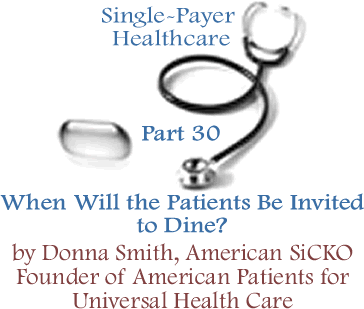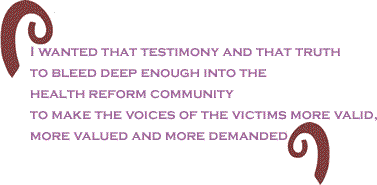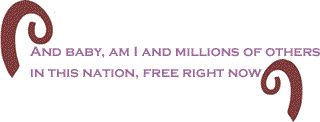
|
|||||||||||||||||||||
|
||||||||||
|
||||||||||
|
The current issue is always free to everyone If
you need the access available to a |
||||||||||
 |
||||||||||
 |
||||||||||
|
It’s worse than being a lap-dog. No matter what station in life or educational degrees or talents any American may have held before he or she fell victim to the health care crisis in this nation, inclusion in the national debate – the real national debate in which the powerful speak to the powerful – is still closed to all but the elite. And until the patients and families are truly embraced in this fight and included in the debate about solutions, they will remain second-class citizens, poster children at best, with little true power. Many in powerful positions in government say they understand and they even fight for critical change. The best and most genuine example is that of Rep. John Conyers, D-MI, and chairman of the House Judiciary, who has put forth a real reform plan with HR 676 and who truly does embrace those who have suffered. At a recent break-out session for the Black Caucus Legislative Conference in Washington, D.C., Rep. Conyers stayed in the Convention Center room long after other celebrities had made their statements and slipped off to their busy schedules. Conyers chatted with patients and with families and with a steely yet loving eye-to-eye conversation, let each person know the suffering matters, the pain is understood by one of Congress’ most powerful men. But what is up with the rest of our policy groups and policy makers, media members and conference planners that they remain too self-absorbed, too busy and too important to stoop down and embrace those devastated by this crisis? The real details of the health care crisis – the truth about what happens in those doctors’ offices, clinics and hospitals – really does rest in the minds and hearts of those who have been crushed. And many of the best solutions rest there too. After I testified to a sub-committee of the House Judiciary about the health care crisis and what it is doing to well-educated, middle class citizens, I wanted that testimony and that truth to bleed deep enough into the health reform community to make the voices of the victims more valid, more valued and more demanded. Yet, to date, that has not materialized. Oh, we victims are invited to make brief remarks to open an event or sometimes make brief nods in response to applause, but take a look at any major conference planned on this issue, and I’ll bet you that no patient or family member gets more than two or three minutes' time to speak and certainly no time to discuss policy.
As an example, get a load of this one: http://www.uninsuredcongress.com/ Here we have the announcement of a major conference in our nation’s capital in early December. Now read the presenters list. PhDs, Esquires, doctors, lawyers, CEOs and other high muckity-mucks – oh, yes, they are there. But patients? Not one on the agenda. Not one. Not even a break-out session. Not even a mention. The only true experts on this crisis are not valued enough to even be included. A Congressional staffer once told me, “It’s like running the civil rights movement without African Americans.” Indeed. That’s why statements born of pain and suffering, like union man Steve Skvara, offered at a Democratic candidates’ debate in Chicago in August, stand out so much. His voice, his plea is but one of millions. And he hurts so much that the tidbits of concerned head-tilting and listening for a few weeks, by those with something to gain from it (votes or ratings), will soothe him for a while. Then those powerful few will march right on past him and on to the next chance to look like they truly value the opinions of the wretched masses. I am so angry. I have felt a sort of discrimination that is disgusting and makes me distrust so very deeply. For I am the poor face of what the for-profit health system has created. And now that the system has squeezed all of my financial security away and left me unable to buy the new clothes or dresses or cars or hairdos or even the social interactions that would signal my worth to those who have power, I don’t know what I can do to reach my fellow Americans who are too tacky for inclusion in the events where the value of our very lives will be decided. So, you’ll keep hearing from me as I pound my fists on the table and on the doors and windows to power. The group I founded after I spoke my truth to power in my Congressional testimony is called “American Patients for Universal Health Care” (apuhc.com). And though we’ve attended many functions and we are growing in numbers, our power has yet to be fully realized and our group is still invited to attend but not yet participate.
We held vigils across America last week to call attention to health care justice issues. It was our first national action but by no means our last. And until the press takes note and the powers that be take heed, we will raise our voices louder and louder. But I was reminded once again this week, “Freedom’s just another word for nothing left to lose…” And baby, am I and millions of others in this nation, free right now. Hang on to your hats, those of you in power. If you cannot hear the polite knocking and the gentle requests for our seat at this fictional table you keep talking about, that decides health care policy, we will not be the servants dishing up your feast and cleaning up your dishes on election day. Donna Smith is one of the "stars" of Michael Moore's documentary "SiCKO" and Founder of American Patients for Universal Health Care. Click here to contact Ms. Smith and Healthcare-NOW. Click here to read any of the articles in this special BC series on Single-Payer Healthcare. |
||||||||||
| October
11,
2007 Issue 248 |
|
| Printer Friendly Version in resizeable plain text format format |
 |
 |
 |
| |
| |

































